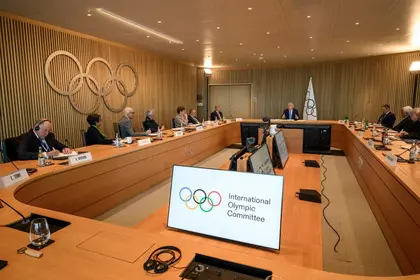Ukraine’s Sports Minister Vadym Gutzeit does not “exclude the Russians making a ‘goodwill gesture’ not to go” to the Paris Olympics next year, he told AFP in an interview.
Gutzeit added if the Russians and Belarusians were permitted by the IOC to compete in Paris as neutral athletes and Ukraine boycotted the Games “other countries that have suffered from Russian imperialism at different stages of their history will join this boycott”.
JOIN US ON TELEGRAM
Follow our coverage of the war on the @Kyivpost_official.
The IOC has yet to make a decision on whether Russians and Belarusians can take part in the Paris Games -- which run from July 26 to August 11 2024 -- as neutral competitors.
Since Russia launched its war in Ukraine in February 2022, the IOC imposed sporting sanctions on Moscow and its ally Minsk, but earlier this year it recommended Russian and Belarusian athletes could compete as individuals in qualifying events under a neutral flag and with no anthem.
The decision provoked howls of protest from both the Ukrainian government and their athletes criticising the IOC for placing the human rights of Russian athletes above theirs.
This resulted in Ukraine barring their athletes from competing at events where Russians and Belarusians were -- tennis being the exception as it has been since the invasion as they compete as individuals.
However, last month there was a dramatic change of tack from the Ukrainian government permitting their athletes to take part in events where the Russians and Belarusians were competing as ‘neutral athletes’.

US Must Address Russian Disinformation to Strengthen US Election Integrity
- ‘Right side of history’ -
Gutzeit is well aware of how important the quadrennial spectacle is to athletes having won fencing gold in 1992 in Barcelona in what was a Unified Team made up of 12 of the former Soviet Republics including Russia.
Ironically one of his team-mates in the gold medal-winning sabre team was Stanislav Pozdnyakov who is now his avowed opponent as he is the head of Russia’s Olympic Committee.
“If Russian athletes are at the Olympics, then Russian propagandists will try to turn this celebration of sport into a celebration of propaganda, just as Hitler once did,” Gutzeit said referring to Nazi Germany’s hosting of the 1936 Summer Olympics in Berlin.
“I believe that the IOC will not allow the aggressors to do this.
“I also do not exclude that the Russians will make a ‘goodwill gesture’ and say that they will not go.”
Gutzeit, who has been in his post since 2020, said he is confident the IOC and sports federations will bar the Russians and Belarusians from the Games.
“The ball is now in the court of the IOC and international sports federations,” he said.
“I believe that they will continue to stand on the right side of history and prevent the aggressors from participating in the Games.”
Nevertheless Gutzeit says if they are permitted to compete then Ukraine could still boycott the Games and would be followed by others.
The Baltic states and Poland have been the most vociferous countries in threatening to follow the Ukrainians if they do boycott the Games.
“I do not rule out that if Russians or Belarusians are allowed to participate in the Olympics and we boycott the competition, other countries that have suffered from Russian imperialism at different stages of their history will join this boycott,” he said.
As for Podzniakov’s remarks the IOC were siding with Ukraine in urging federations to show sensitivity to Ukrainian athletes Gutzeit is dismissive.
“Over the sound of Russian missiles exploding and Russian machine guns firing, it is impossible to hear what individual Russians are saying,” he said.
The conflict has taken its toll on sporting infrastructure with a human cost too.
“Stadiums can be rebuilt, infrastructure can be restored, but lives cannot be returned,” said Gutzeit.
“The war takes away our best every day. More than 300 Ukrainian athletes and coaches have been killed in this war.”
Gutzeit says they will be honoured in a project called ‘Angels of Sport’ because “we count each one and remember each one”.
“These heroic boys and girls were supposed to conquer sports peaks, they were supposed to live, enjoy themselves, become popular,” he said.
Gutzeit, 51, said this “war leaves a mark on all Ukrainians”.
“Some lost their father; others lost their neighbour or former classmate,” he said.
“The mother of Kateryna Tabashnyk (2023 European indoor high jump bronze medallist) was killed in the shelling of residential areas in Kharkiv by Russians.
“Among the ruins of the house, we also found Kateryna’s awards, which her mother kept.”
You can also highlight the text and press Ctrl + Enter






